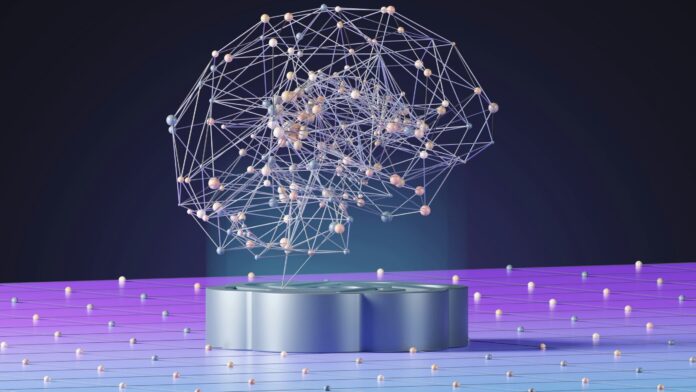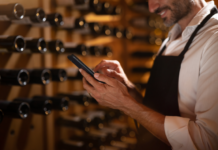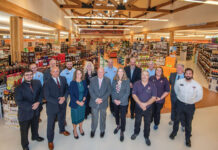Beverage alcohol retail technology remains ever-changing and constantly evolving. Especially with the plethora of opportunities that AI brings to the table, it’s crucial for independent liquor stores to keep up with the market.
“Because of all of these technologies that have changed the market, customer expectations are higher than what they used to be,” mentions Kristine Joji, EVP of strategy consulting for Insight AI. “As technology solutions such as pricing, visibility, delivery and data are becoming more available, it’s going to lead to a potential decline in business in liquor stores if they don’t aggressively manage it.”
Artificial Intelligence is taking the digital transformation industry by storm. Whether it’s by streamlining employee processes, improving quality control, predicting demand and optimizing the supply chain, every aspect of a business has become easier with the help from AI.
Meeting Customers Where They Want to Shop
Since Covid, more consumers are getting used to purchasing alcohol online. While there are a variety of delivery services out there to help liquor stores ship to customers, many retailers still don’t offer this option.
The SmartCommerce Omnichannel Report, issued in June 2024, highlights dynamic shifts in purchasing behaviors for alcohol beverages. The majority of shoppers (64%) still prefer to purchase alcohol beverages entirely in-store, with 16% using a combination of online and in-store, 11% opting for online with in-store/curbside pickup and 9% choosing online with delivery. Despite the slower shift in this category, the trendlines towards online purchasing is undeniable and likely to follow the trajectory of other CPG goods.
Even though most consumers are purchasing their alcohol in stores, there’s no denying the growth of e-commerce. And liquor stores need to catch on before they get left behind.
“Given these evolving consumer preferences (and expectations), it’s critical for liquor store retailers to embrace e-commerce technology and establish a more robust online presence, beyond just having a website,” advises EVP of partnerships at SmartCommerce Don Knapp. “It’s true that online shopping for beverage alcohol products is more challenging because of all the legalities and restrictions, but the days where loyal shoppers will swing by the same liquor retailer and chat up the clerk are numbered. Shoppers want their beverage of choice, their brand of choice, as fast and affordably as possible.”
Determining Customer Demand
Aside from meeting consumers wherever they want to shop, you also need the right products on hand. Generative AI can help liquor stores determine demand and plan their inventory accordingly.
“Retailers, distributors and manufacturers can all leverage gen AI for a supply chain health check,” says Lisa Henriott, SVP Product Marketing, Logility. “Anyone can ask questions like ‘Show me the 3 top selling products this week,’ or ‘Show me the products with the lowest safety stock’ or even ‘Who your best or worst customers or categories are.’ AI helps retailers transform their inventory from a source of excess cost to a competitive advantage by creating an optimized plan that minimizes carrying costs while avoiding stockouts. Gen AI is great for spotting imbalances between demand, supply and inventory, improving overall performance.”
Aside from the beverage alcohol industry, even sectors less typically thought of as “early adopters” of new technology are actively exploring and experimenting with gen AI. Marc Kermisch, chief digital and information officer at CNH Industrial NV, a global manufacturer of agricultural and construction machinery headquartered in London, United Kingdom, told the Harvard Business Review in a white paper that he believes it is “an imperative and an obligation” to actively explore its potential in his business.
Kermisch explained that CNH Industrial is categorizing generative AI use cases into three core areas, one of them being customer impact. Using gen AI to provide access to knowledge and tools that make it easier for customers to use their products and interact with the company is imperative, as stated in the white paper.
Optimizing Employee Tasks
AI can also help beverage alcohol brands address a variety of different administrative tasks that are time consuming for employees. Repetitive functions such as order processing, checking compliance, checking stock, reporting the financials and other mundane duties can easily be taken over by AI.
“In the beverage alcohol industry, processing incoming orders from retailers, generating invoices and other tasks beyond that has already been taken over by AI,” says Asif Rehmani, founder and CEO at VisualSP.
VisualSP offers a Digital Adoption Platform that utilizes AI to offer employees training, in-context support and integrated messaging on enterprise web applications. For example, it can help guide a sales rep to make the next best step in order to secure a sale.
“Within the beverage industry, you have CRMs like Salesforce, Planner and all kinds of methodology you’re using to ensure people are making the right decisions,” explains Rehmani. “Our platform can help stop employees before they make a mistake such as messing up an order. Compliance and regulation also becomes easy since AI is guiding them. There are amazing things happening in the AI space to make decision-making super easy and enhance productivity.”
AI in the Warehouse
Members of the middle tier across the country are using AI technology to help streamline warehouse operations. Southern Glazer’s Wine & Spirits, for example, just recently partnered with Symbotic Inc. to deploy its AI-powered software and robotics warehouse automation systems in select Southern Glazer’s distribution centers. The companies have agreed to implement the first of these systems by 2025, according to a news release.
Symbotic’s automation system will enable Southern Glazer’s to improve fill rates, order accuracy and customer service times at its distribution centers, while also extending the capacity and useful life of its existing facilities. The system will build mixed-case pallets for efficient route-stop delivery and more accurately handle both high velocity and slow-moving inventory, as stated in the release.
ShipLab’s co-founder Alan Silberstein notes three key areas in which warehouses are using AI to help solve some common issues:
Automation and Robotics: There are many robotics companies trying to either replace or enhance human productivity within the warehouse environment. However, robotics technology may not quite be ready to be fully incorporated into 3PLs, most of which deal with a wide variety of different product sizes and weights. Robotics is typically better suited for consistent form factors.
Standardization of Data and Integration: Despite having access to a plethora of technology, the logistics space remains heavily reliant on physical paper or manually written emails for communication and documentation. Where previous technology integrations required highly structured data, current implementations that use AI allow for a more flexible approach. This will likely lead to greater adoption across different transport carriers and warehouses.
Warehouse Space Optimization: AI is incredibly good at understanding correlation across large datasets. This is important because properly analyzing and using data within a warehouse can increase productivity through space optimization. For example, AI can identify what combinations of products are most commonly ordered together and then assemble a new storage configuration plan to bring those products closer together and make them more accessible.
“AI has taken hold first in supply chain visibility — getting ETAs for shipments that parallel the visibility we can get as consumers from delivery services like DoorDash or Uber,” says Edmund Zagorin, founder and chief strategy officer, Arkestro. “Additionally, AI models analyze consumer behavior and historic purchasing trends to forecast demand more precisely at the level of individual locations and micro distribution centers, preventing overstock and stockouts. For procurement teams, AI can help balance the spot market with long-term contracts, which improves efficiency and cuts costs. In short, AI is becoming essential for better decision-making and operational efficiency in the beverage alcohol industry.”
AI Improving Order Accuracy
The Lucas Warehouse Optimization Suite, or Jennifer™, developed by Lucas Systems, works as the brains of RNDC’s warehouses. The system is at work in both the case pick and bottle pick areas, serving as an imperative part of RNDC’s fulfillment system.
Jennifer™ is AI-powered intelligence that optimizes and orchestrates warehouse operations. According to Ken Ramoutar, CMO of Lucas Systems, Jennifer™ processes all of the orders that come in and then distributes that work to employees out on the warehouse floor through a headset.
“What Jennifer™ does is she instructs the workers on exactly what to pick for every customer in the most efficient way possible,” he says. “This system helps streamline the entire bottle picking process, allowing warehouse workers to use both hands while listening to what Jennifer™ tells them to do, without complications.”
The Future of AI
Rehmani notes that one of the most important things to keep in mind about AI is that it’s not here to replace our jobs. It is simply here to make our lives easier.
“I don’t think AI will replace jobs,” he says. “Similar to other technologies that have taken over, we will always have jobs, but they may just be higher level ones. AI is our co-pilot and humans will remain the main pilot.”
Instead of worrying about AI taking over our jobs, companies need to start embracing this technology, especially if they want to succeed. “Businesses who want to thrive in today’s market need native AI planning solutions,” notes Logility’s Henriott. “Starting smart with driver-based forecasting that learns from the impact of promotions, seasonality and new product introductions is key to increasing margins.”
Feature photo by Growtika on Unsplash.
Krystina Skibo is the Trade Managing Editor at Beverage Dynamics. Reach her at kskibo@epgacceleration.com. Read her recent piece, Liquor Stores Make Room for Cannabis and CBD Beverages.












